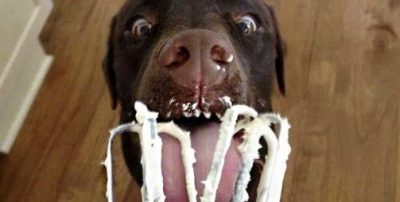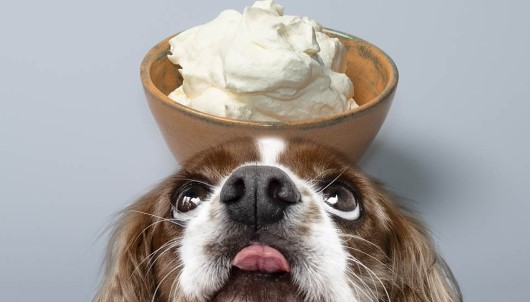Yes, Dogs can eat whipped cream in moderation, as long as it doesn’t contain any artificial sweeteners like xylitol that can be toxic to them.
Whipped cream is safe for dogs, but it should only be given as an occasional treat due to its high-fat content, which can lead to weight gain and digestive issues.
It would be safe to consult your veterinarian before introducing new foods to your dog’s diet.
Table of Contents
Can Dogs Eat Whipped Cream Safely?
Dogs can have whipped cream in small amounts infrequently. Whipped cream is unlikely to harm most healthy dogs. However, there are some safety precautions to keep in mind regarding sugar, fat, and lactose content.
Occasionally, allowing your dog a lick or two of whipped cream is less likely to cause problems than frequent large servings. Stick to one or two tiny teaspoons at most. This small portion prevents digestive upset or unhealthy spikes in blood sugar.

However, dogs with conditions like pancreatitis, inflammatory bowel disease, obesity, or lactose intolerance often cannot safely tolerate high-fat foods like whipped cream. The lactose in dairy can also disagree with some dogs. If your dog has trouble processing fat or dairy, do not share whipped cream to avoid issues. Know your dog’s digestive sensitivities.
The sugar in whipped cream can lead to dental cavities or other oral health issues if allowed to remain on your dog’s teeth. So, after allowing a small whipped cream lick, gently rinse your dog’s mouth with water to prevent lingering sugar from sticking to the teeth.
Whipped Cream Ingredients
The consumption of whipped cream by dogs raises questions about the safety of its ingredients. Common components found in whipped cream include additives and sweeteners.
| Components of Whipped Cream | Health Implications |
| Additives | Additives such as emulsifiers and stabilizers are often used in whipped cream to enhance texture and shelf life. While these additives are generally recognized as safe for humans, their impact on dogs can be uncertain. |
| Sweeteners | Whipped cream may contain sweeteners like sugar or artificial alternatives such as xylitol. Sugar in moderation is less concerning for dogs, but xylitol can be extremely toxic and lead to severe health issues. |
Dog owners should exercise caution when considering feeding whipped cream to their pets. While small amounts of plain whipped cream might be safe as an occasional treat, checking the ingredients and avoiding sweetened or flavored versions is essential.
Potential Benefits of Whipped Cream for Dogs
While whipped cream should always be fed sparingly as a treat for dogs, there are some potential benefits it can offer canines:
Energy Boost
The high-fat content in whipped cream provides a lot of calories that can translate into an energy boost. That may be especially welcomed by active, high-energy dogs like those used for sports or working roles. A small amount of whipped cream can help fuel their activities.
Encourages Eating
The sweet, creamy taste of whipped cream entices many dogs. Adding a teaspoon or two to their regular food may tempt picky eaters to eat. While whipped cream shouldn’t replace proper nutrition from dog food, it can provide an incentive to eat.
Occasional Treat
When used extremely sparingly, whipped cream can give dogs a sweet, indulgent treat occasionally. That should only be on rare special occasions, though, not regularly.
Potential Risks of Feeding Dogs Whipped Cream
While tiny amounts of whipped cream given rarely are unlikely to pose major issues for most healthy dogs, there are some potential risks to be aware of. Here are some of the key reasons to exercise caution when considering sharing your whipped cream-topped treats with your canine companion:
Weight Gain
One of the biggest risks of giving dogs too much-whipped cream is unhealthy weight gain, leading to obesity over time. Whipped cream is high in fat and calories, which can quickly add extra pounds, putting your dog at risk for other health issues.

Digestive Upset
After consuming whipped cream, some dogs may experience vomiting, diarrhea, or other stomach issues. The lactose and fat content are common culprits that irritate the digestive system, especially in dogs prone to sensitivity or intolerance.
Tooth Decay
The sugar content of whipped cream poses a risk of tooth decay and other oral health issues in dogs if allowed to remain stuck on their teeth between brushings. Make sure to rinse your dog’s mouth after consuming any sugary foods.
Blood Sugar Spikes
In diabetic dogs especially, the sugar in whipped cream can cause dangerous spikes in blood sugar levels. But even in healthy dogs, too much sugar can be problematic and bothersome.
Should You Feed Your Dog Whipped Cream?
Before introducing any new foods, it’s wise to consult your veterinarian, especially for dogs with health conditions like diabetes, allergies, or gastrointestinal issues. Ask your vet if a small amount of whipped cream now and then would be suitable or risky.
The potential for encouraging unhealthy obesity outweighs the benefits. Always feed treats judiciously based on your dog’s current body condition.
If your vet gives the okay and your dog is fit, a tiny amount of whipped cream occasionally is unlikely to cause harm. But moderation is imperative, both in portion size and frequency. Too much can quickly lead to issues.
Pay attention to how your dog reacts after tasting whipped cream for the first time. Gastrointestinal upset, lethargy, or changes in thirst indicate that whipped cream may not agree with your pup. Seek veterinary advice if you notice anything concerning.
Monitoring Your Dog’s Dietary Health
Monitoring your dog’s dietary health is important to ensure their overall well-being. One way to do this is by keeping a food diary for your dog. That will help you track what they eat and any potential reactions they may have.
Look for signs of a balanced canine diet, such as a shiny coat, healthy weight, and regular digestion. It’s important to note that while some dogs can tolerate small amounts of whipped cream, it should not be a regular part of their diet.
Whipped cream is high in fat and sugar, which can lead to weight gain and digestive issues in dogs. Additionally, some dogs may have lactose intolerance and should avoid dairy products altogether.
Always consult your veterinarian before introducing new foods into your dog’s diet.
Why Do Dogs Like Whipped Cream?
It’s common to see dogs eagerly lap up any bit of whipped cream they can access. Begging for a tasty morsel with big, pleading eyes focused on your dessert.
The lightly sweet flavor and smooth, airy texture of whipped cream are very palatable to most dogs. The fat content also carries appealing flavor compounds. It tastes good to their sensitive taste buds, much like it does for humans. The texture also feels pleasantly creamy for dogs to consume.
Also, dogs have a phenomenal sense of smell, much better than humans. So, the rich, sweet, creamy aroma of freshly whipped cream is difficult for curious snouts to resist investigating. They can smell the whipped cream and immediately want to check it out.
FAQs on Can Dogs Eat Whipped Cream
Can Dogs Have Whipped Cream?
Yes, dogs can have a small amount of whipped cream as an occasional treat. However, remember that too much can cause digestive issues.
Is Whipped Cream Safe For Dogs?
Whipped cream is generally safe for dogs, but avoiding options with added sugars or artificial sweeteners is important, as they can be harmful.
Are There Any Health Benefits To Giving Dogs Whipped Cream?
No, whipped cream doesn’t offer any specific health benefits to dogs. It’s best to stick to treats formulated for canine consumption.
What Are The Potential Risks Of Dogs Eating Whipped Cream?
Due to the high fat and lactose content, dogs eating whipped cream may experience stomach upset, including diarrhea or vomiting. So moderation is key.
Bottom Line
Whipped cream may seem harmless, but it is not the best dog treats. The high sugar content and potential for lactose intolerance can lead to digestive issues and weight gain. Instead, opt for dog-friendly alternatives like plain yogurt or frozen fruit.
Always consult your vet before introducing new foods to your furry friend’s diet. Keep their health and well-being a top priority.
















